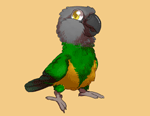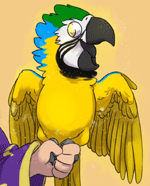 Kili
Type: Senegal Parrot
Genus: Poicephalus
Species: Senegalus
Subspecies: Mesotypus
Sex: Female
Weight: 120 grams
Height: 9 inches
Age: 17 years, 1 month
|
 Truman
Type: Cape Parrot
Genus: Poicephalus
Species:Robustus
Subspecies: Fuscicollis
Sex: Male
Weight: 330 grams
Height: 13 inches
Age: 15 years, 4 months
|
 Rachel
Type: Blue & Gold Macaw
Genus: Ara
Species:ararauna
Sex: Female
Weight: 850 grams
Height: 26 inches
Age: 13 years, 1 month
|
List of Common Parrots:
Parakeets:
Budgerigar (Budgie)
Alexandrine Parakeet
African Ringneck
Indian Ringneck
Monk Parakeet (Quaker Parrot)
Parrotlets:
Mexican Parrotlet
Green Rumped Parrotlet
Blue Winged Parrotlet
Spectacled Parrotlet
Dusky Billed Parrotlet
Pacific Parrotlet
Yellow Faced Parrotlet
Lovebirds:
Peach Faced Lovebird
Masked Lovebird
Fischer's Lovebird
Lilian's (Nyasa) Lovebird
Black Cheeked Lovebird
Madagascar Lovebird
Abyssinian Lovebird
Red Faced Lovebird
Swindern's Lovebird
Lories and Lorikeets:
Rainbow Lorikeet
Conures:
Sun Conure
Jenday Conure
Cherry Headed Conure
Blue Crowned Conure
Mitred Conure
Patagonian Conure
Green Cheeked Conure
Nanday Conure
Caiques:
Black Headed Caique
White Bellied Caique
Poicephalus Parrots:
Senegal Parrot
Meyer's Parrot
Red Bellied Parrot
Brown Headed Parrot
Jardine's Parrot
Cape Parrot
Ruppell's Parrot
Eclectus:
Eclectus Parrot
African Greys:
Congo African Grey (CAG)
Timneh African Grey (TAG)
Amazons:
Blue Fronted Amazon
Yellow Naped Amazon
Yellow Headed Amazon
Orange Winged Amazon
Yellow Crowned Amazon
Cockatoos:
Cockatiel
Galah (Rose Breasted) Cockatoo
Sulphur Crested Cockatoo
Umbrella Cockatoo
Moluccan Cockatoo
Bare Eyed Cockatoo
Goffin's Cockatoo
Macaws:
Red Shouldered (Hahn's) Macaw
Severe Macaw
Blue And Gold Macaw
Blue Throated Macaw
Military Macaw
Red Fronted Macaw
Scarlet Macaw
Green Winged Macaw
Hyacinth Macaw
Glossary of Common Parrot Terms
|
| | Thursday December 22nd, 2011 |
|
I get often asked about leaving parrots home while going on vacation. Well this article is about how going away on vacation ends up being a vacation for the parrots as well! There are many reasons we can't bring our feathered friends with us whether its safety, accommodations, going abroad, or just needing to get away from the squawking and cleaning for a little bit. So this article is about making your absence tolerable for your parrots.
The first and definitely most important thing for preparing your parrots for your absence is getting them used to being without you beforehand. When we hear of stories of an owner leaving a parrot home a week to come back and find it plucked naked, often this is a result of the parrot being completely spoiled with attention and then suddenly deserted. But just like taming, independence also takes some getting used to for our feathered pals. Even if you don't see yourself going on vacation any time soon, it is still important to maintain a controlled relationship. What if someone in your family becomes ill and needs care? What if you get sent some place for work? There are many unexpected scenarios besides just taking a vacation that may require our parrots to cope without our presence. The only way to prepare them for this is by letting them experience this beforehand.

Your parrot needs to be just as capable of spending time alone as with you. Surely many of us are more concerned with taming and getting them to behave with us, but we must not take this too far and make them entirely dependent on us either. This is why (both for training and vacation purposes) I recommend limited out of cage and interaction time daily. There are minimums and they are much discussed, but I also believe there should be maximums. It's impossible to put exact numbers on it but the point is that your parrot needs to spend enough time in its cage on its own every day that it won't entirely freak out when suddenly you aren't around a day.
It is important to provide good cage enrichment and activities. Of course this is much discussed elsewhere and is a good practice all the time. While maintaining routine is convenient and reassuring, it's important to be spontaneous from time to time. Yes, I try to be home to see my parrots on time, feed them at the normal time, etc. But once in a while if I need to be out late or decide to put them to sleep late than usual, it just prepares them for dealing with out of the ordinary scenarios. If I actually end up going a very long time without a natural break in the routine, I may opt to not take them out a certain day despite being home just to simulate this. But normally there are real reasons for this to happen so I generally save it for these occasions.
Don't be scared to leave the parrots home for an entire day or weekend (preferably with someone to keep an eye on them). If you've never done it before, be sure to see how they do a weekend without your presence prior to leaving them for an entire week or more. Try progressively longer durations. If you are leaving the birds alone for 12-48 hours without anyone to check up on them, consider leaving multiple sources of food and water in case any are spoiled or contaminated. A water bottle is preferable. Never leave parrots completely unattended for more than 2 days at a time though because if anything does happen to their food/water supply, they won't be able to make it much longer than this without intervention.
A question that frequently comes up is if it is better to leave parrots at home and have someone come to take care or to bring them along with their cages to someone else's home. Unless it cannot be arranged, I think it is much better and safer for the parrots to stay home. Not only are they familiar at home but they will also feel safer. To take both their favorite person away and the familiarity of their surroundings is more stressful. People worry that they'll get bored without people around, but I think if you make the above mentioned preparations they will be equipped to deal with it. Another thing is that the parrots are significantly safer remaining in your own home. As a parrot owner, you've probably spent years making your home bird safe. It is easy to begin to take this for granted and forget dangers they could face in someone else's home such as teflon fumes, other pets, children, ceiling fans, windows, etc. For all these reasons, it is best to have a sitter come briefly to your home to care for the parrots each day rather than take the birds to their own home.
When having someone birdsit for you, one of the most important considerations is whether or not they will handle the parrots. In most cases, unless the person is both familiar with parrots and specifically familiar with handling yours, it is safer not to have them let the parrots out. As much as it sucks to stay in the cage for two weeks straight, it is safer than being let loose in your home by someone who can't put them back away. Still, discuss a contingency plan with the birdsitter about what to do if they get out and cannot be returned to their cage. The sitter should leave the cage doors open and cage loaded with food so that the parrot can eventually go back inside to feed.
When I am away, I like to leave my parrots more toys than usual to keep them busy. I put in several new toys to provide with more activity and material for the parrots to play with. However, I also like to leave a few old favorite toys for familiarity as well. I make sure not to rearrange the perches just before leaving instead favoring a tried and true cage layout. This is not the time to experiment with new kinds of toys though, so any new toys that are provided should be similar to safe/successful toys in the past.
I usually end up writing a basic manual covering all things that need to be taken care of and possible contingencies for my bird sitter. So not only do I tell about the basic things that need to be done but also what to do in case there are problems and I cannot be reached. This includes biting, escape, illness, vet care, etc. At the same time, I try to reduce unnecessary activities by as much as possible not to burden the sitter too much.
The birds are fed exclusively pellets while I'm gone. Why? This is safest, simplest, and most nutritious. This is the least burden but also least responsibility for the care taker. The parrots are guaranteed to get all the nutrition they require, the food won't spoil, and it's very easy to guarantee that they don't run out of food in any way. Although I normally follow strict food management, I have my birds overfed while I'm gone. A normal pellet meal won't even line the entire bottom of their food bowls but when I'm gone I have the bowls nearly topped off. I make sure the birds are left with enough food to last several days despite the sitter coming daily. This is to ensure that if for any reason the sitter skips a day, the birds have enough food and water to get by. While we are concerned about long term diet and variety in their meals, a 100% unlimited pellet diet for a few weeks won't do any harm for a parrot that is accustomed to eating pellets.

 Aritos, Latin American Onion Ring Parrot Chips (Ara + Fritos = Aritos?) Aritos, Latin American Onion Ring Parrot Chips (Ara + Fritos = Aritos?)
Finally, the reason I called this parrot vacation is because if done right, this can be as much of a relaxing vacation for your parrots as it is for you. Recently I spent a week traveling in Central America while my brother came once a day to take care of Kili and Truman. He is fully qualified to handle them so he would let them out for as much as an hour every day to fly around. They couldn't be more thrilled! I came back to find they had assumed full control of the situation! My computer mouse was destroyed, poop all over the carpets, and the birds helping themselves to places I would never allow them to go. Not only this, but they stuffed their crops to the brink for every day nonstop. No discipline, no food management, no responsibility. It truly was a vacation for them as well. But this is ok. Let them have it easy while you're gone and then work the taming, training, and order back in once you return.
So with all the preparations that were made over time, it was no trouble at all to leave the parrots home for a week. I got to take a vacation and do some traveling. Meanwhile Kili & Truman also got to take a vacation from training and just enjoy being wild for a little bit.
Part of: General Parrot Care, Blog Announcements, Cape Parrots, Senegal Parrots
Parrots Vacation Cartoon |
|



 Aritos, Latin American Onion Ring Parrot Chips (Ara + Fritos = Aritos?)
Aritos, Latin American Onion Ring Parrot Chips (Ara + Fritos = Aritos?) Previous Article
Previous Article Next Article
Next Article